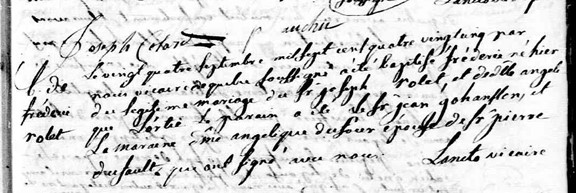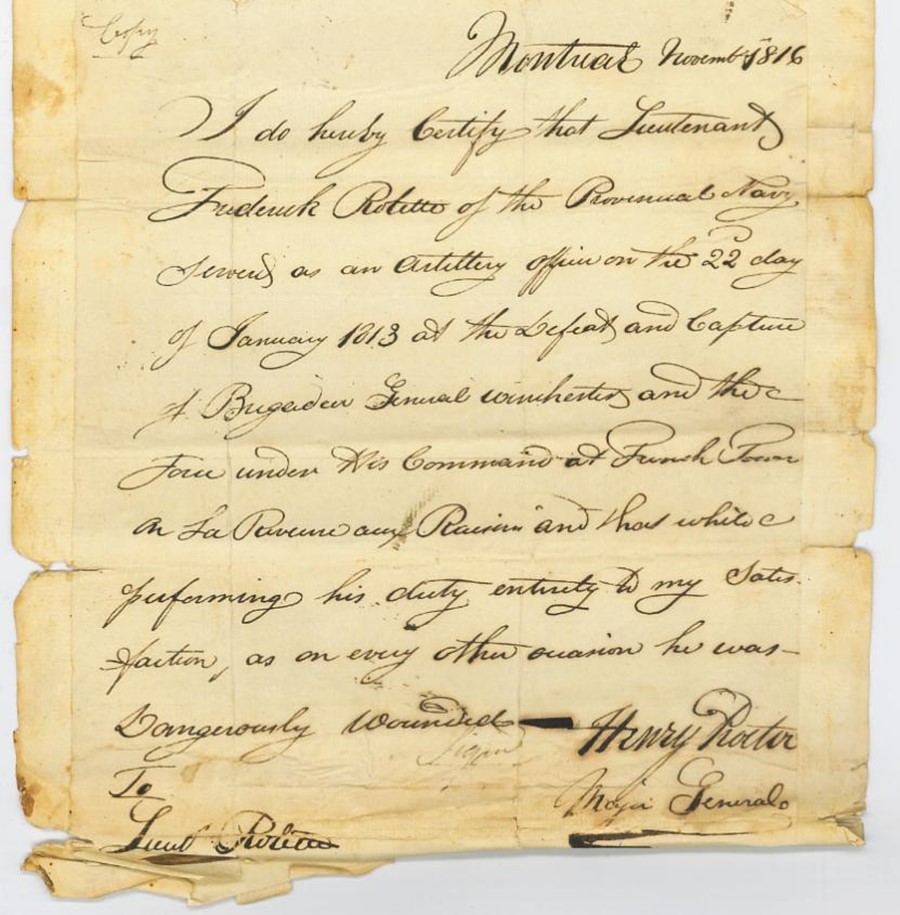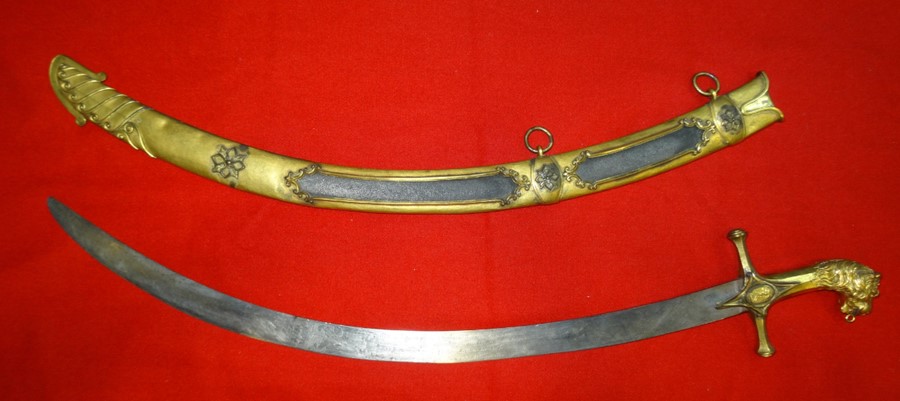Frédéric Rolette, lieutenant in the British Provincial Navy of the Great Lakes, Canada (born 23 September 1785 in Quebec City; died 17 March 1831 in Quebec City, Canada). A career sailor, he took part in the War of 1812 and distinguished himself in battles that earned him the esteem of his comrades and the praise of his officers. A Royal Canadian Navy ship, HMCS Frédérick Rolette, was named in his honour.

Career in the Navy
Little is known about Frédéric Rolette's childhood. He was born at Quebec on 23 September 1785 and lived near the Port of Quebec, where ships frequently anchored. It is possible that Rolette felt a certain fascination for the sea, as he joined an English ship at a very early age. In fact, the archives of the City of Quebec show that his father, the merchant Joseph Rolette living at 21 Côte de la Montagne (now Maison Narcisse-Turcot), was already living alone in 1798. The young Rolette therefore signed up at the age of 13 at the latest. Although this age may seem young, it should be noted that at that time, boys as young as nine years old were serving in the navy. Whatever the reasons for his departure, he set sail and we lose track of him until 1806, when he returned to Upper Canada and settled in Amherstburg (now Ontario).
An eyewitness, Thomas-René-Verchères Boucher de Boucherville, recounts: "I was introduced to a young man named Frederic Rolette, who was a clerk for Mr. Robert Reynolds [the son of Thomas Reynolds, commissioner for the British army]."
One day I was walking up and down the balcony of the house where I was staying on Queen Street, feeling gloomy and depressed, when young Rolette, who lived nearby, came to see me. We were almost the same age, and had conceived a mutual attraction. I learned that he was from Quebec […] From this time we were united in a friendship which ceased only with his death.
Rolette must have distinguished himself during his service at sea, as he was appointed second lieutenant in the Provincial Navy, the British naval service on the Great Lakes, on 4 October 1807. He could not have obtained this position without having previously been a lieutenant in the Royal Navy.
War of 1812
In June 1812, war broke out between Great Britain and the United States. (See War of 1812.) News traveled slowly at the time, and it took some time for the remote posts to be informed. At the outbreak of hostilities, Frédéric Rolette, who was now commander of the brigantine HMS General Hunter, distinguished himself with an audacious feat of arms: the capture of the American ship Cuyahoga Packet. Witnesses recount:
Finding myself by chance at the shipyard [...], I came upon Lieutenant Frederic Rolette in the act of launching a boat manned by a dozen sailors, all well armed with sabers and pickaxes, and I hastened to ask him where he was going with that array. "To make a capture," he replied, as he ordered his men to row in all haste in the direction of the vessel which was slowly but steadily making her way up the river, all unconscious of the fate awaiting her. – Verchère de Boucherville
They were armed with cutlasses and heavy pistols belted around them. […] Captain Rollet the naval officer pointed a pistol at Lt. Gooding who was standing near the helm and repeated the order, “dowse your mainsails.” Lt Gooding cried: “I have no command here sir.” A shot was then fired directly at us, […]— William K. Beal, American sailor
Benefiting from the element of surprise, Rolette seized the American boat without resistance. This capture, the first of the war, proved fruitful because the ship carried about 40 soldiers and military documents containing valuable information on American forces and their deployment. This information was put to good use in British Major-General Isaac Brock's strategy for the capture of Fort Detroit the following month, in August 1812, with the help of the warriors of Chief Tecumseh's Confederacy. Covered by fire from HMS General Hunter and Queen Charlotte, the assault was a success, and by August 16, the British controlled all of Michigan.
On 22 January 1813, Rolette participated in the Battle of Frenchtown, also known as the Battle of Rivière-aux-Raisin, as an artillery officer, where he once again distinguished himself by his temerity. On the morning of the battle:
Rolette came up to me […] and said he was very sick – that he had a racking headache. I recommended him to return. The brave little Frenchman turned upon me as if I had insulted him. He was detailed to take charge of a gun, he said; to go back would be eternel disgrace. Look here, said he, producing a heavy bandana handkerchief, tie this tight around my head. I rolled it up thick, and did so. I am better already, he remarked, and pushed on. — Robert Reynolds

During the battle, Rolette was severely wounded by a bullet in the back of the head. He lost consciousness for several hours, but survived. "After the battle, he came back to see me,” remembered Robert Reynolds. "This scarf," he said, "saved my life: look here; and in the folds of the scarf was a rifle bullet, which had partially passed through the silk, and had flattened on one side on his skull. […] He was in front of our lines, in the centre, and had been wounded by our own men.”

This injury did not prevent him from continuing the war. Once recovered, he participated in the Battle of Lake Erie on 10 September 1813, where, as usual, he demonstrated impressive composure and tenacity. He was then a first lieutenant on HMS Lady Prevost. The battle, which pitted a flotilla of six English ships against nine Americans, turned into a disaster for the British. The captain of the Lady Prevost was quickly put out of action and the command fell into the hands of Rolette, who led a fierce fight "[...] until, being dangerously wounded on the right side, and severely burned by an explosion of gunpowder, which killed and wounded a great number of his men, he surrendered to the enemy his vessel, which was almost nothing but debris.” Captured by the Americans, he remained in the United States for nearly 12 months as a prisoner of war.
Inheritance
Once the war was over, Frédéric Rolette returned to Quebec City. As a token of gratitude, an honorary sword was offered to him by friends and citizens. The sword has a gilded copper scabbard and steel blade engraved with mythological figures. The inscription reads as follows:
Presented to Lieut. Frederic Rolette, of the Provincial Navy, a Canadian born subject who distinguished himself on many occasions during the late American war, particularly in the naval action on Lake Erie, of the 13th September 1813 under the brave Captain Barclay, as a testimony whereof, his school companions, with other loyal and patriotic Canadians voted fifty guineas for his sword.

Rolette died on 17 March 1831 at Quebec, wounds from which he never really recovered. The 46-year-old man was survived by his wife, Luce Bouchette, who was granted a pension by the government, and his five children. A township in the Chaudière-Appalaches region was named in his honour in 1868. His sabre, as well as the documents attesting to his actions during the War of 1812, are now preserved in the Naval Museum of Quebec.
On 16 July 2015, the Royal Canadian Navy announced with great fanfare that a new offshore patrol ship would be named HMCS Frédérick Rolette. The ship was officially welcomed into naval service on 13 June 2025 during a commissioning ceremony in Quebec City. HMCS Frédérick Rolette is the fifth Harry DeWolf-class Arctic and Offshore Patrol Vessel.

 Share on Facebook
Share on Facebook Share on X
Share on X Share by Email
Share by Email Share on Google Classroom
Share on Google Classroom






